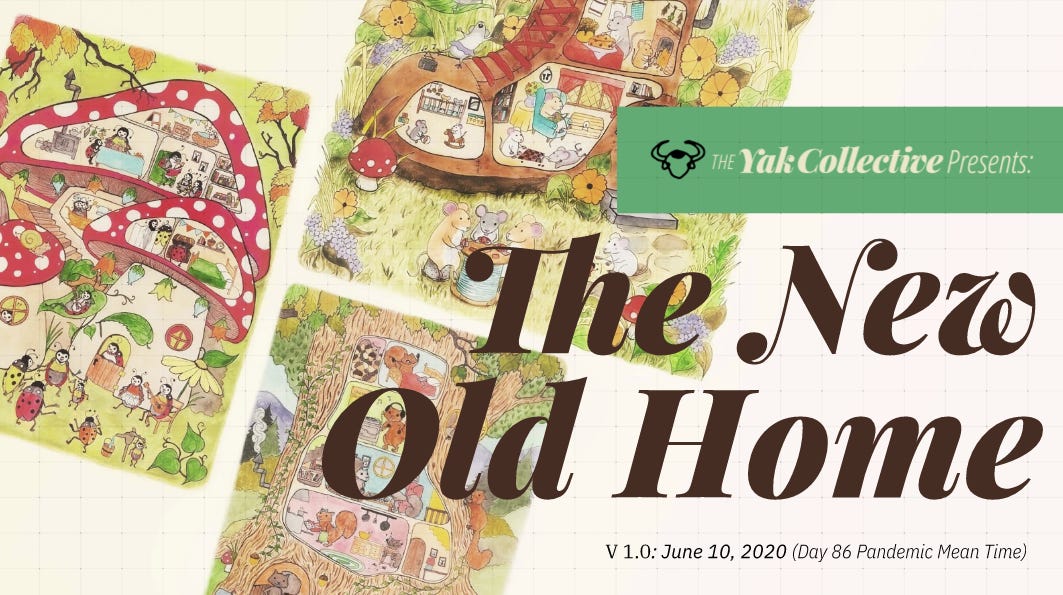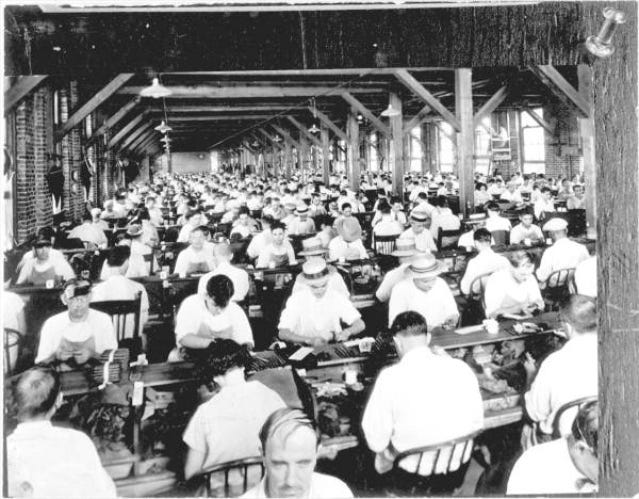#99 Full-Time Work Games & Reimagining The Home
😷 Pondering how work became so central in our lives
July 4th, 2020 - Las Palmas, Spain
👋 Greetings to the 30 new followers. To subscribers new and old, hit reply and say hi, I love hearing what brought you here and more importantly, what keeps you here :-)
Happy July 4th to my fellow Americans 🗽 - I am heading to Barcelona Monday before heading back to Connecticut for a few months the following week. We spent the week exploring Gran Canaria this week which was incredible and surreal as there were no tourists anywhere. Here is a picture from the sand dunes in Maspalomas

If you’d like to subscribe or upgrade to become an ongoing patron of the newsletter, you can do this here before you dive into this week’s issue:
#1 What Game Are You Playing?
Understanding the reality of work is a meta-theme of this newsletter. I think that our conception of work is based on a labor economy model that doesn’t exist anymore and an accidental life path that emerged as a side effect of that model. The inability for many people to achieve success within this paradigm has led to a lot of suffering despite the fact that work has gotten a lot better for many people.
When I was in college I had a simple model of work, shaped by the select few companies that recruited at my school and the neatly presented career paths from their websites and information packets. It all seems quite cute looking back on it, but I believed it. I really thought that the first job out of college would largely determine the rest of my life.
Most people who enter the business world realize quickly that work is much more than applying the right tools or doing good work. At GE I learned that getting the support of people high in the org chart was the most important thing to spend my time on. Once I knew the game that was being offered I wanted out.
Look at what people do, not what you want them to do
Many people look at people’s behavior at work through the same lens they might judge their friends and get confused.
“my boss is an asshole, I can’t believe they did this…”
From a different perspective your boss might be correctly assessing his situation and realizing that there is little to no cost to treating his team poorly.
In some ways, the biggest value of a top-tier MBA program is about understanding these hidden incentives and figuring out what really matters for success at work.
Most career advice is terrible for the average person, who will get taken advantage of by people who are figuring out the hidden games. Here are a few things I’ve learned through the years:
“Work hard” is good advice in a fast growing startup, but in a stagnant large organization, you are better off spending your time cultivating relationships with influential people.
If you want to get paid more, work in a company or industry that has high profits. Also the closer to financial transactions you are, the more you will make. This works within any type of firm too (M&A or strategy groups often are highly compensated)
Beware of advice from people that came of age during different economic environments. At an executive search firm I worked at, I saw terrible advice dished out weekly by senior leaders making $1M+ a year who started working when the firm was much smaller, growing much faster and responsibility was given to people at a young age and without a formal career path. If you are getting advice from people who didn’t go through the same 10-step career path ahead of you, it’s probably best to come up with your own work strategies
Many people seem to think its a bad idea to leave a job “too soon” but in reality companies will still hire you even while telling you that they are concerned about job hopping. Of people I talk to that leave jobs where they were miserable, almost everyone wishes they left sooner.
Similar to #4, if your boss is an asshole, there are better odds you’ll get fired before they do because the boss will drive you crazy and undermine your performance
Impact is overrated at scale. One of the groups of people that reach out to me most often are the people that work in non-profits, NGOs and in CSR. These people typically have an incredible desire to help people, but end up disillusioned by the compromises that these types of large organizations make. If you want to have an impact, try to find small organizations or activities that don’t scale.
Complaining about work with your colleagues only gives more power to the people you are complaining about. It builds rapport with your colleagues and makes you feel like you’ve done something about the injustice.
How to defend against cynicism
Marissa Mayer once claimed to work 130 hours in a week while at google. I’m guessing she doesn’t subscribe to this newsletter. Yet I think she had it right when talking about burnout:
"Burnout is about resentment…It's about knowing what matters to you so much that if you don't get it that you're resentful."
The biggest defense to cynicism at work is figuring out what matters. For Mayer, work was what mattered.
For most people, if you follow the Mayer path you will be miserable. When people are honest about what they value, they rarely put work at the top. Yet one of the biggest traps facing young people is that when the enthusiastic socializing of your 20s fades, many find themselves spending their time as if work is the most important thing in their lives.
The boomers ended up in family-focused communities in their 30s. Millennials find themselves at home in their small city apartment scrolling twitter.
One of my professors talked about finding things you can commit to 100%. Not 99%, but 100% - meaning you would never compromise on such a thing.
This could be something like never going to your daughter’s soccer games, never missing a family holiday or working on a weekend. Some of these have costs, but you need to be willing to drop the ball at work to reshuffle what matters.
#2 Homes, Covid & The Future of Place
The Yak Collective put out a new report which I was not involved in titled the “New Old Home.” It’s worth checking out in full.

Many people are thinking about our Covid work from home experiment as a temporary blip, but I think it is much deeper than that. Many people are frustrated at home and are desperate to return to work, but many more are finding themselves imagining new possibilities for how they might like to spend their time in the future.
Here are five things the report made me think about
#1 The loss of work identity
For people who who build their lives around their work commute, work persona, dress and community. Many of these people are either out of work or have had to work from home. You’ve seen people try to replace this by leveling up their remote work setups and even investing in physical decorations to express themselves in video calls. Many are opting for virtual backgrounds too.
Do you want to show people your humorous side?

Or your serious side?

#2 The Ritual Of Work:
Getting up, getting dressed and commuting to work is a ritual for many. Without that ritual, people feel a bit naked.
This discomfort is likely behind the unprecedented number of people that have reached out to me in a state of confusion over the past few months about something being “off” with their work.
Human crave rituaals. As people are pondering “Why was I spending two hours every day in a car?” they will also start to come up with new habits and rituals to define their days.
#3 New Possibilities For “Homes”
As a nomad, I think about the interaction between where I live and how I live all the time. I’ve always been fascinated by how my habits changed depending on where I lived. In Boston, when I moved neighborhoods, I ended up hanging out with one of my close friends a lot less because instead of a 5 minute walk, we were separated by a 20 minute subway ride. Living in Thailand, Indonesia, Taiwan and Spain over the past couple of years it is even more striking how my energy, enthusiasm for activity and social relationships are dictated by where I live and who I live with.
Many people have become more sensitive to where they live while spending many more hours at home. City dwellers are making quick moves to the city and others are thinking about redesigning their spaces.
#4 The Backyard Office
Many people do not like working in their home. I think we’ll see a lot of creative solutions to the “backyard office” and other third places that are better than just working from a co-working space or coffee shop. Consider the Zen work pod:

#5 The Future Of The Family
It was fascinating to watch many of my millennial peers head back to live with their parents or other relatives during the pandemic. Many young professionals are now living in cities in small apartments distant from family while older generations typically have wealth and empty bedrooms. It will be interesting to see if we see a movement towards living in multi-generational houses again, which was the norm until the 2nd half of the 20th century.
More likely, we will see interest based communities form in lower cost locations built around high-wage remote workers. I write this living in a coliving house in Spain right now where rent is about $1000 a month. A much better deal for many who are working in high-priced cities.
#6 Homeschooling
Homeschooling went from something that people were skeptical of to something that parents were in charge of while working. Millions of parents have now at least familiarized themselves with basic tools and approaches to home-schooling and have also seen the limits of zoom-based education for young children.
While many parents are ready to send their kids back to school, it seems that some of the stigma of homeschooling has disappeared.
#3 The Factory Model Of Schooling Critique Is Suspect

I always find myself skeptical of narratives that are too clean. The “factory model” of schooling critique has always felt a bit too clean.
Here is Audrey Watters on a messier history of education:
It’s tempting to say that those who argue that today’s schools are fashioned on nineteenth century factories have never read much about the Industrial Revolution.
and
And so too we’ve invented a history of “the factory model of education” in order to justify an “upgrade” – to new software and hardware that will do much of the same thing schools have done for generations now, just (supposedly) more efficiently, with control moved out of the hands of labor (teachers) and into the hands of a new class of engineers, out of the realm of the government and into the realm of the market.
#4 Conformity of the 1950s

From a young person in the 1950s:
We don’t want to rebel against our elders. They are much too nice to be rebellable-against. Old revolutionaries as they are, they get rather cross with us and tell us we are stuffy and prudish, but even this can’t provoke us into hostility…. Our fathers … brought us up to see them not as the representatives of ancient authority and unalterable law but as rebels against our grandfathers. So naturally we have grown up to be on their side, even if we feel on occasion that they were a wee bit hard on their fathers, or even a little naïve - The Organization Man
#5 The Limits Of Management Thinking
From Gianpiero Petriglieri in HBR
Consider, for example, most management research or popular management writing. It is predicated on a portrait of management, when done well, as the way to predict and solve practical problems. And it is dedicated to offering prescriptions for managers to address those problems. How do I make decisions? How can I be heard? How can I stay productive? How do I help my team succeed?
In many circumstances, the theories and tools that help answer instrumental questions suffice. But they are of little help when existential questions surface, such as, How long will we be around? Do we matter? Are we in charge? Those are mid-life questions, for individuals. And they are the very questions we ask ever more often of management at this existential juncture.
…Gran Canaria
A couple more pictures from explorations this week. What a beautiful island!







